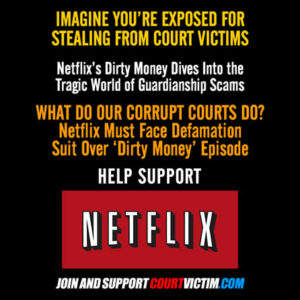
Netflix’s Dirty Money Dives Into the Tragic World of Guardianship Scams
The investigative documentary series’ second season tackles an insidious form of financial abuse.
etflix’s investigative docuseries Dirty Money, which examines financial misdeeds, is back for a second season. And one of the show’s most shocking new episodes, “Guardians, Inc.,” tackles abuses in the world of elder guardianship, a system that controls the lives of an estimated 1.5 million adults with estates worth more than $250 billion—and that is rife with financial fraud and elder abuse.
When older or disabled adults are found to be unable to manage their affairs, the state may step in and and assign them a legal guardian to control their finances and medical decision making. It’s designed to protect the assets and well-being of those who’ve lost the ability to make sound decisions for themselves, but it gives those appointed guardians near-total control over those in their care, and can leave elderly people vulnerable to those who don’t have their best interest at heart.
As Dirty Money revealed, in states like Texas, guardians are entitled to earn commissions on sales of their wards’ assets, on top of drawing wages for themselves, assistants, and lawyers. Abuses have been reported for decades; in 2001, the New York Times wrote of one lawyer who served as guardian for senior citizens. He brought a birthday cake to one ward’s nursing home and charged her estate $850 for the visit. On another occasion, he took her to buy an ice cream cone and charged her $1,275.
Journalist Rachel Aviv, who’s featured in the Dirty Money episode, wrote an in-depth examination of guardianship abuse for the New Yorker in 2017. Her story focused on Rudy and Rennie North, a retired Nevada couple who were married for 57 years before professional guardian April Parks arrived at their home in 2013 and forced them to move to an assisted living center. Parks, who’d won control of hundreds of wards over the years, had, without the Norths’ knowledge, filed an emergency petition to become their guardian, convincing a judge with the help of a letter from a physician’s assistant who had a single appointment with Rennie that the couple could no longer responsibly handle their affairs.
Netflix Must Face Defamation Suit Over ‘Dirty Money’ Episode
Netflix Inc. and others lost their bid to escape a defamation lawsuit over a “Dirty Money” episode, when a Texas appeals court said Wednesday the show misrepresented the facts of a businessman’s guardianship when presenting it as abusive.
“Dirty Money” is an investigative series that bills itself as exposing greed and corruption. Tonya Barina is the great-niece and guardian of Charles Thrash, a millionaire who made his money from an automotive repair business. Barina sued Netflix claiming the gist of the episode “Guardians, Inc.,” which aired in March 2020, defamed her.
The 79-year-old Thrash was presented in the episode as being capable of taking care of himself, with the help of his girlfriend, Laura Martinez. However, court records indicate Thrash suffers from Alzheimer’s disease that leaves him “totally incapacitated” and unable to enter into a contract or marry, the Texas Fourth Court of Appeals said.
During the episode Martinez, who is erroneously referred as his common law wife, and others speak for Thrash, the appeals court said. However, the defendants were aware that these speakers were found not to be credible by the trial court in Thrash’s guardianship case, it added.
The episode uses its score and dramatic animations to indicate that guardianship abuse is an epidemic that must be exposed, the court said. Barina’s interview is presented differently than others by zooming in on her hands and feet to show her fidgeting, and cutting away to highlighted documents or statistics to suggest inconsistency.
An ordinary viewer would reasonably conclude that Barina is meant to be portrayed as an exploitative guardian who sold Thrash’s assets as his family and friends tried to stop her, Justice Patricia O’Connell Alvarez wrote.
Nexflix contended that they can’t be held liable simply for reporting the accusations made by Philip Ross, Martinez’s lawyer. But the third-party allegation rule requires a media outlet not take the additional step of adopting or endorsing the allegations, the court said.
The trial court therefore didn’t err in denying Netflix’s motion to dismiss, the San Antonio appellate court said.
Justices Irene Rios and Beth Watkins joined the opinion.
Haynes & Boone LLP represented Netflix, Jigsaw Productions LLC, Muddy Water Productions LLC, Martinez, Ross, and the other defendants. Glenn Deadman of San Antonio and Carl J. Kolb of Austin represented Barina.
The case is Netflix Inc. v. Barina, Tex. App., 4th Dist., No. 04-21-00327-CV, 8/31/22.
To contact the reporter on this story: Janet Miranda in Houston at [email protected]
To contact the editors responsible for this story: Rob Tricchinelli at [email protected]; Brian Flood at [email protected]
